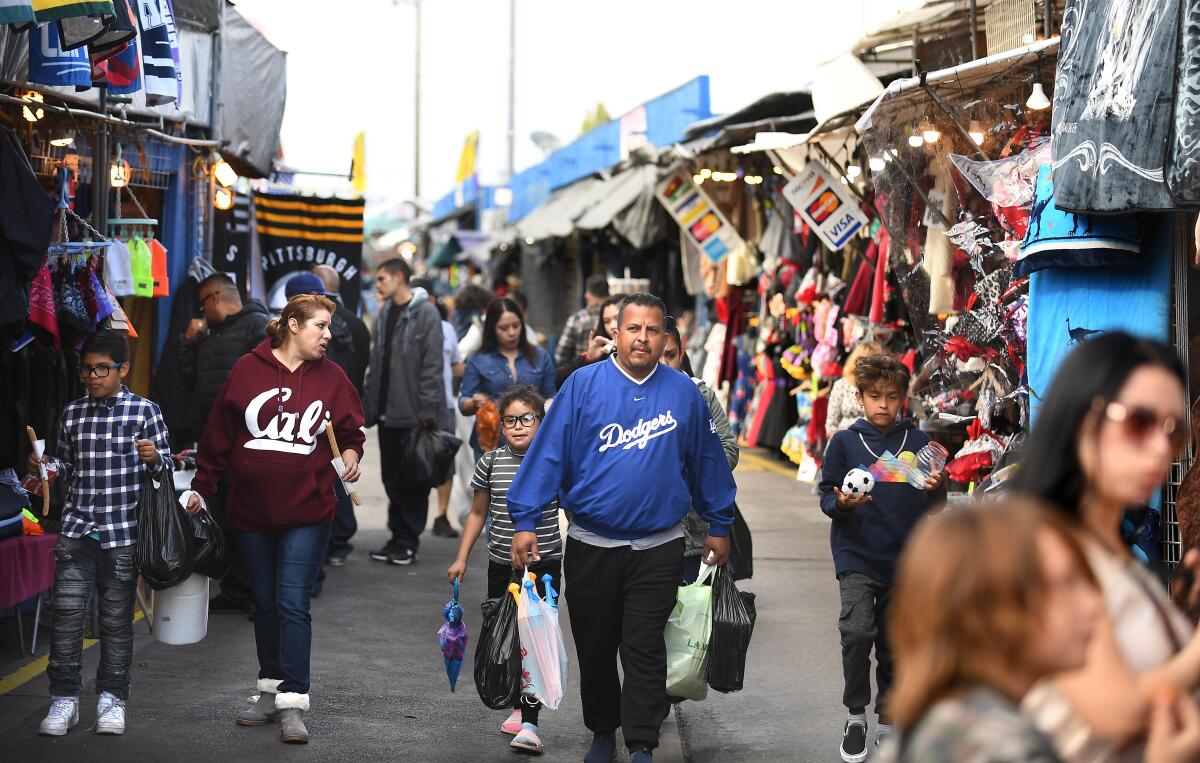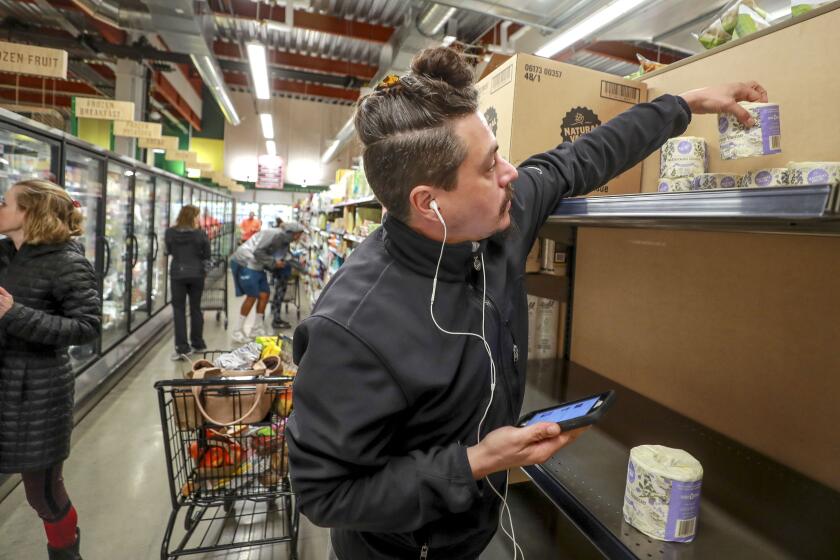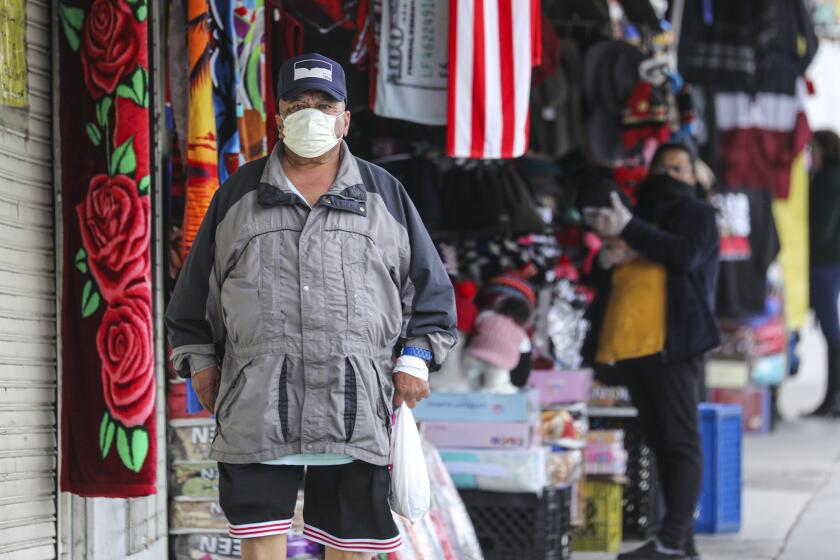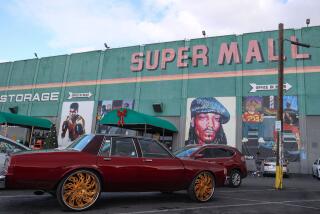Now missing at L.A. swap meets: live music and cheap toilet paper

- Share via
Even the swap meets are running out of toilet paper to sell.
On Sunday, vendors at two Los Angeles-area swap meets said they were clean out of T.P., the maddening symbol of coronavirus panic shopping. The hoarding is leaving empty shelves at supermarket stores across Los Angeles — and in the case of a typical Southern California swap meet, empty sections of asphalt where stacks of paper goods used to be abundant.
“There is no more,” said Maria Osorio, a 74-year-old immigrant from Jalisco, Mexico, who runs a stall of paper products, disposable plates and cleaning supplies at the Santa Fe Springs Swap Meet.
Osorio, a vendor there for 25 years, seemed upbeat about her sales. “My $5, $15 and $18 packs are all gone,” she said.
A few stalls down, a vendor at a similar stall of cleaning supplies said he had no more tissue rolls for sale, either. Yet a pile of packages poked out from behind some boxes, and he was asked about their availability. “Oh, someone already bought those,” the vendor said. “They’re getting them later.”
People are panic-buying toilet paper. But is there any actual risk that the U.S. could run out?
In Los Angeles, immigrant and immigrant-oriented shoppers know that swap meets and street-vendor rows, from Central Avenue in South L.A. to Alvarado Street in MacArthur Park, can be the last option for classic household cleaning and hygiene items at basement-level prices — or the first option, if you’re savvier than most.
But as fears and panicky impulses spread statewide leading up to the March 16 closures of restaurants, bars and many other public places in a drastic bid to stop the spread of the coronavirus, the bath tissue market is being thrown into disarray at every level. It’s happening at 98-cent stores and at cheap-for-all SoCal swap meets, where options range from name-brand resale items to off-brand products of uncertain provenance.
Like a tianguis
Amid sales of oldies CDs, used clothes and leather goods, a typical swap meet contains a healthy amount of stalls that feel like corner stores without walls. They sell shampoos, diapers, soaps, bleach products, paper towels, feminine hygiene pads, disinfectants, gloves and, yes, stacks of toilet paper, all below cost compared to chains or even small retail stores.
Many vendors move with their goods in trucks and vans from swap meet to swap meet, across the region, throughout the week. It’s a semi-underground industry in which vendors buy products from wholesalers, usually near downtown, and take them directly to their customers on the street. Or at a drive-in theater parking lot, where many Southern California swap meets still operate.
At outdoor swap meets in south and southeast Los Angeles County, the vibe also replicates a typical Mexico tianguis market, with food and snack stalls, and a central stage where on weekends live bands play metal, mariachi and banda shows. The Santa Fe Springs Swap Meet is known for booking tribute bands to Metallica, Rage Against the Machine, Social Distortion, Red Hot Chili Peppers and more. Concession buildings are permitted to sell beer and micheladas.
On Sunday, the live music that usually draws throngs of people together was canceled at Paramount and Santa Fe Springs to help prevent virus spread. Refunds were being given for next week’s planned concert by the popular La Septima Banda at the Santa Fe Springs Swap Meet. But the beers were still flowing as late afternoon shoppers lingered.
At their stalls, vendors and shoppers shared alarm over reports of price-gouging of bath tissue. Where 12-pack packages two weeks ago sold at an everyday bargain of $5, on Sunday, in the early-morning rush, 12-packs were going for $12, or a dollar a roll.
That’s unheard of in the swap meet environment, where cheap prices reign. By comparison, at some chain retail locations, 12-packs of toilet paper can go for $15 and even $38 and $55 on some online sites. Osorio balked at the idea of raising her own prices. “It’s blackmail, pure robbery,” she said with a huff.
Meanwhile, as The Times reported on Saturday, toilet paper production remains steady, and that means that supply ignores demand. Because the industry is not in any actual disruption, it’s only a question of who gets to buy toilet paper first.
At one swap meet stall, that was no later than 7 a.m.
The Paramount Swap Meet in nearby Paramount saw thinner crowds than usual, but cleaning supply sellers were cashing in. Gina Navarro, at a corner stall lined with mops and brooms, said most of her toilet paper ran out as soon as the swap meet opened, at 6:30 a.m.
“Paper, paper, all paper,” Navarro said. “They don’t stop asking for it.”
Just then, a customer walked up, requesting the hot item. “Tuesday,” Navarro responded, a bit unconvincingly. Paramount is closed on Mondays, but maybe the forecast of rain and COVID-19 jitters might keep her home, she said.
Get the latest coronavirus updates from our staff in California and around the world.
Elsewhere, vendor Michel Zamora, an immigrant from Mexico City, said his usual stall with cleaning supplies and hygiene products has been without toilet paper since the end of February. He simply ran out, and said he stopped restocking, at least until the coronavirus panic-shopping blows over.
“It started dropping about two weeks ago,” Zamora said. He said he’s got toilet paper and money saved up. He’s ready. He’s got other jobs, and the swap meets so far are staying open. “Take care of your paper!” he added.
A woman then walked up, pleading for a roll of the product that really just about everyone uses. “Please don’t tell me you don’t have toilet paper! I’ve gone to all the stores.”
“I just don’t have any,” Zamora replied. “We’re going to start folding over the one-ply, into triangles, to make it last.”
More to Read
Sign up for Essential California
The most important California stories and recommendations in your inbox every morning.
You may occasionally receive promotional content from the Los Angeles Times.
















